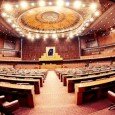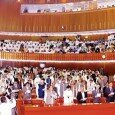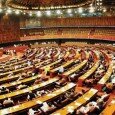By Qamar Zaman –
The breach of privilege, in practice, appears to be a tool to harness non-pliant bureaucrats and officials. Committee records reinforce this
It takes a lot to become a parliamentarian in Pakistan but once there, the world is at his/her feet — or so it is deemed. The parliamentarian can drag people for breach of privilege even over a refusal to take a phone call. Parliamentary privileges are certain rights and immunity enjoyed by members of parliament, individually and collectively, so that they can discharge their functions. When any of these rights and immunity is disregarded, the offence is called a breach of privilege and is punishable under the law.
Procedure
In this regard, Rules of Procedure and Conduct of Business of National Assembly have laid down a procedure in Chapter XII which deals with the issue of privileges. According to the process, a member may, with the consent of the Speaker, raise a question involving a breach of privilege either of a member or of the Assembly or of a Committee thereof in the manner prescribed in rules 95-101.
A member who wishes to raise a question of privilege should give a notice in writing to the Secretary before the commencement of the sitting on the day he/she proposes to raise the question.
A question of privilege is given precedence over an adjournment motion, according to the rules. Rule 97 has defined the conditions of admissibility of question of privilege. According to this, ‘The right to raise a question of privilege shall be governed by the following conditions, namely: (a) not more than one question shall be raised by the same member at the same sitting; (b) the question shall relate to a specific matter and shall be raised at the earliest opportunity; and (c) the matter shall be such as requires the intervention of the Assembly.’
Afterwards, if the Speaker holds the motion to be in order, the Assembly may consider and decide a question of privilege or may, on a motion either by the member who raised the question or by any other member, refer it for report to the Committee on Rules of Procedure and Privileges.
“Given the trivial nature of cases, appropriate action in most cases was not taken after the involved parties resolved the issue following the intervention of a third party connected to those in dispute”
The Speaker is also empowered to refer any question of privilege to the Committee on Rules of Procedure and Privileges for examination, investigation and report, and to implement the decision of the Assembly, and any matter requiring action against a government functionary is referred to the concerned division or ministry. The compliance report is to be submitted to the Assembly within the specified period.
Even allowing for the rules and a Standing Committee on Rules of Procedure and Privileges headed by Abdul Ghafoor Chaudhry from the ruling Pakistan People’s Party (PPP) comprising 23 members of the National Assembly, there is hardly any case in which punitive action has been reported against any official.
According to the committee record, as of June 18, 2012, 33 cases have been decided and 41 are still awaiting appropriate action. The committee took up seven privilege motions during a meeting last month.
Nature of cases
Complaints against the police surpass all other departments; these include action demanded against the Inspector General and Station House Officers. Among pending cases, five relate to non-attendance of telephone calls by public servants — four of these movers are from the ruling PPP.
According to the record, PPP’s Ramesh Lal, who represents minorities, had raised a question of privilege against DCO Karachi for refusing to attend a phone call in June last year.
Tariq Shabbir, also from the PPP, had raised a similar question against DCO Lahore whereas Kishan Chand Parwani, representative of minorities from the Pakistan Muslim League-Quaid (PML-Q) said SSP Umerkot Sindh breached his privilege by not attending his phone call. Dr. Lal Chand Abro, another representative of the minorities from the PPP, also raised the question of breach of privilege against Tehsildar District Hyderabad for the same reason.
Abdul Ghafoor Chaudhry, the incumbent chairman of the standing committee from the PPP, had also moved a privilege motion against the MD Sui Northern Gas Pipelines, saying the official had failed to complete development projects and take his phone calls.
Jamshed Ahmed Dasti from the PPP is the only member National Assembly whose four cases of breach of privilege are pending whereas one case in which he had accused Inspector General Police and Chief Secretary Punjab for misbehaviour have been disposed of.
Interestingly, PML-N’s Rana Afzaal Hussain had moved a privilege motion, which has since been disposed of, against Pakistan International Airlines for change of his seat — from Economy Plus to Economy class by the national carrier’s staff at Lahore airport.
Given the trivial nature of cases, appropriate action in most cases was not taken after the involved parties resolved the issue following the intervention of a third party connected to those in dispute. There are perhaps political considerations for the reluctance shown by Sindh Assembly to take action against Chaudhry Nisar Ali Khan.
The Sindh Assembly Committee on Rules and Privileges warned it would declare the leader of the opposition in the National Assembly a ‘proclaimed offender’ if he did not appear before it to explain his remarks against Sindhi culture, but it did not come to pass.
The committee gave Nisar a ‘last chance’ to appear before it on June 14, and warned legal action could be initiated against him under Sindh Assembly Privileges Act, 1975 if he did not turn up. Nisar had said, “They (ruling leaders) wear Sindhi cap and Ajrak whenever a difficult time faces the country to gain sympathy of (Sindhi) people, while President Asif Ali Zardari has appointed ‘bouncers’ in the Sindh Government.”
Similarly in August 2003, the-then government had sought disqualification of all opposition members of the National Assembly, accusing them of breaching the privilege of parliament and defaming the armed forces and the judiciary.
A most significant case where action was taken belongs to neighbouring India in which the-then prime minister Indira Gandhi was expelled from the House in 1978 after the-then home minister moved a resolution of breach of privilege against her following observations made by a judicial commission which probed excesses during the Emergency.
Why action is not taken
“Politicians are people who can easily accept sifarash (reference/recommendation by some influential),” was the candid response of former chairman of the Standing Committee on Rules of Procedures and Privileges and incumbent Chairman of Public Accounts Committee (PAC).
While elaborating the logic behind this factor, Gondal said politicians have to take care of many things since they have to go to the people one day for their votes. “Politicians do not want to cross a certain limit,” he added. “There is another reason due to which action is not taken and that is people do not want to be at odds with the bureaucracy,” he reasoned.
“The Sindh Assembly Committee on Rules and Privileges warned it would declare the leader of the opposition in NA a ‘proclaimed offender’ if he did not appear before it to explain his remarks against Sindhi culture, but it did not come to pass”
Commenting over the role of the standing committee, Gondal said the committee is not an implementing authority and can only recommend to the relevant authorities for action. Responding to a question about the impotency of the committee, he said there is a need for revamping laws on the subject. “There should be legislation to strengthen the committee’s role,” he added.
On the other hand, a public servant who spoke on the condition of anonymity said privilege motions, in most cases, are used as a tool to harness those officials who refuse to take dictation from politicians. “You can get an idea of this from the nature of these so-called cases,” he said, to substantiate the point. “To that extent, these privilege motions are used as bargain chips”.
Another member of the committee, Muttahida’s Iqbal Qadri, blamed the chairman for the delay in decisions. “It depends on the chairman to convene the meeting since nothing can be done if there is no meeting,” he added. Qadri also seconded the idea of revamping the laws to make the system more effective. He, however, expressed the hope that things would get better with the passage of time and maturing of democracy.
The writer is a parliamentary reporter based in Islamabad































































































